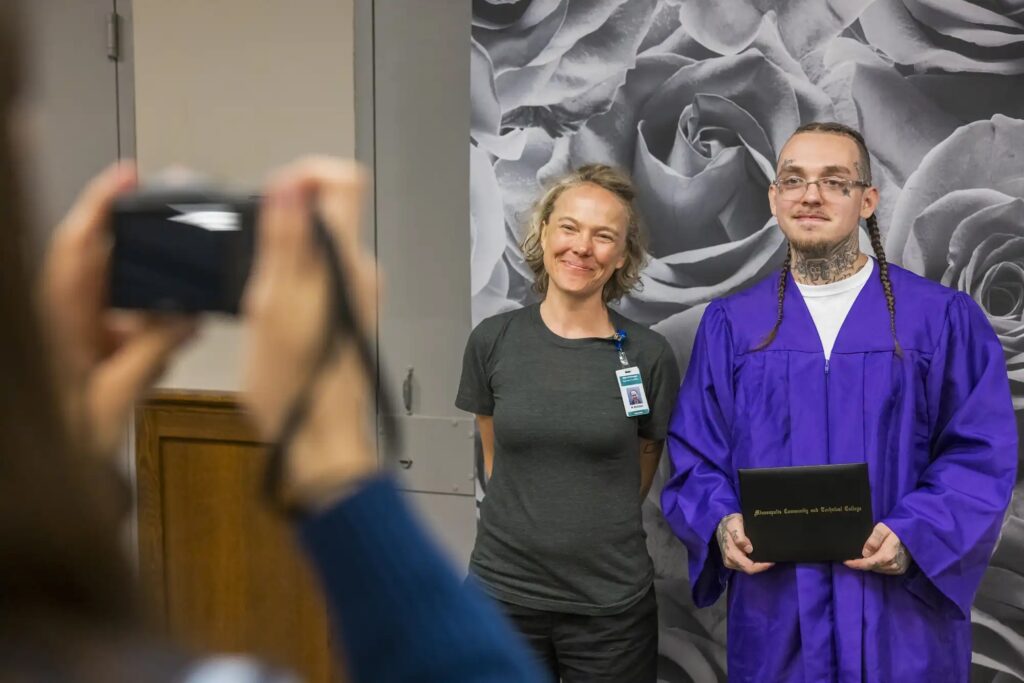
2021
TREC, then called Metro’s College in Prison Program, started at Minnesota Correctional Facility, Stillwater in the fall of 2021. Despite launching in the wake of months-long pandemic-related closures, our grant-supported program was able to serve an inaugural cohort of 48 students, including both those with and without prior college experience. Extending Metro State’s emphasis on student agency and choice for adult and non-traditional learners, our focus was to offer incarcerarted students a path toward a Bachelors of Individualized Studies degree, the core degree of Metro State. Concurrently, Minneapolis College began a grant-funded program at Lino Lakes Correctional Facility.
2022
By the fall of 2022, we were working in close collaboration with both Minneapolis College and the Minnesota Department of Corrections (MnDOC). These partnerships allowed for an expansion of offerings: We were able to extend Metro State’s bachelor’s degree program to Lino Lakes while Minneapolis College extended their associate’s degree program to Stillwater. The continuous strengthening of our partnership with Minneapolis College comes from the understanding that our students are best served when we reject competitive frameworks and hierarchies pervasive in higher education and instead embrace shared services, supports, and resources.
We began participating in the Second Chance Pell Experiment, which enabled students both at Metro State and Minneapolis College to access federal Pell funding for the 2022-2023 academic year. Pell restoration allowed us to enroll more students and undertake new curricular projects.
2023
In January of 2023 we launched our bachelor’s degree program in a third facility, MCF-Faribault, and grew our total number of students to 120. Minneapolis College would later offer their own program at Faribault in the fall of 2023.
Our first graduation was held at Stillwater in the spring of 2023; four students graduated with bachelor’s degrees. At this point we knew we were closer to realizing our goal of offering not only prison education but also substantive reentry work, and so we crowdsourced among students for a new name that would encompass this expansive vision. In this way, TREC (Transformation and Reentry through Education and Community) as it is known today was born. In the fall of 2023, we were able to hire graduate student Will Leaver as a reentry coordinator and started our nascent academic reentry program focused on supporting students transitioning out of prison.
2024
In the spring of 2024 we were awarded a Humanities as Transformative Programming Mellon Grant aimed at supporting curricular innovation, co-curricular programming, and documentation of our curricular work. Through this grant, we were able to support faculty members who, in collaboration with students, worked to reimagine the College of Individualized Studies curriculum to better meet academic goals and interests. These curricular task forces identified interdisciplinary concentrations for which students had continually expressed interest: law and justice studies; science, technology and health studies; markets and communities; and our individualized and interdisciplinary studies core.
Through the Mellon Grant, we were also able to hire staff to fully support curricular needs, including our Grants and Curriculum Coordinator Emily Oliver and two facility coordinators, Michael Lee and Julie Santella, to support daily operations at the facilities. As a result of this staffing, we were able to redefine and refine learning spaces in prison. We worked with MnDOC, emphasizing the necessity of study halls and co-curricular programming in creating an environment where study is a collective act that can occur outside the classroom.
With this philosophy in mind, we developed Learning Labs—spaces that combine academic advising and tutoring and recreate the holistic support systems that students have access to outside of prison. We also developed our Research Clusters, collaborations between students and faculty that provide opportunities for sustained engagement around a research question. While not presuming honors designations, these Research Clusters provide opportunities for students who wish to pursue additional work with additional rigor.
2025
We now offer a robust reentry program and have been able to use work study and student work programs to hire six student workers. We are currently operating in partnership with Seed Coalition to use the AmeriCorps Vista program to hire a justice-impacted Vista worker in a support role for reentry work. Additionally, over the course of the 2024-2025 academic year, we partnered with the Shavlik Family Foundation to offer a laptop program, equipping students transitioning out of prison with life-changing access to technology. In the summer of 2025, we graduated 20 more students, amounting to a total of 67 bachelor degree graduates in Metro State’s TREC program in the first four years of its existence.